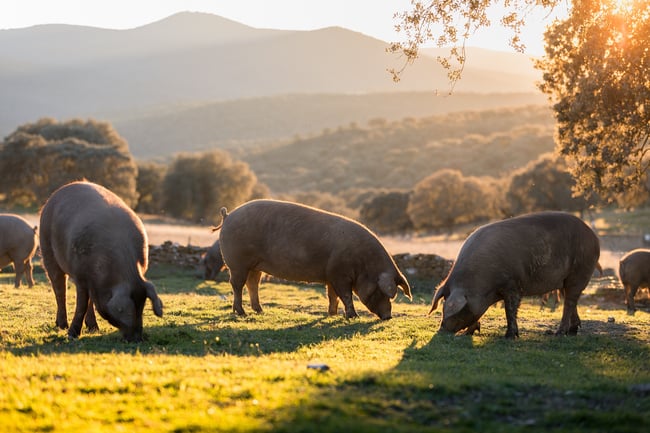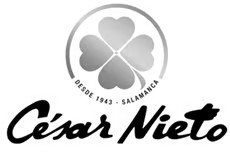

César Nieto
Iberico pork sirloin steaks 2 pieces
ca. 300 g3 DAYS AVERAGE FRESHNESS
ca.
More info
Delivery within 60 minutes
Every day, we source locally for the freshest groceries you can trust.
- Description
- Composition
- Similar products
- More from this brand
- Recipes
2 pieces of loin steak, approx. 150 g each
The breed:
The Iberian pig is descended from the wild boar and the domestic pig and has a history of over 2000 years. They have always been bred under holm oaks and cork oaks, known as "Dehesas", and live there "semi-wild". Because of their black claws, they are often called "Pata Negra".
The name Iberian pig (Cerdo Iberico) can be used for several breeds. The black pig has the highest fat content, the Colorado pig has the largest muscle content of the Iberian pigs and the Torbiscal is a cross between Spanish and Portuguese breeds and is very robust and reproduces well.
All names are in turn divided into different breeds and their crosses.
Habitat:
The Iberian pig is closely linked to the wooded Dehesa pastures. It is kept extensively. The Iberian pig breed has its origin in the Mediterranean pig of African origin.
The pastures where the pig lives are mostly areas with Mediterranean forest, where oak trees (Quercus) grow, which produce acorns, especially holm oaks, cork oaks and Portuguese oaks (Quercus faginea). In between, chestnuts and carob trees also grow. In rainy seasons, pastures are created where the pigs feed.

Feeding:
Within the ecosystem of the Dehesa, grasses grow, which are the ideal food for pigs in spring and summer, while in autumn and winter acorns form the basis of the diet during the fattening period.
The pigs are additionally fattened with cereals, wheat, soya, maize and barley. The pigs are slaughtered throughout the year from at least 10 months and a minimum weight of 155 kg.
Quality and taste:
The meat is characterised by an intense, nutty flavour. This comes mainly from the fat, which is strongly influenced in taste by the acorn fattening. The meat is somewhat darker in colour than conventional pork and heavily marbled with white fat, the intensive marbling is comparable to that of Wagyu beef.
About the manufacturer
The beginnings can be traced back to 1943. At that time, there were only a handful of traders who were involved with the then still unknown Iberian pig. One of them was Alonso Nieto Manzano. At the age of only 20, the present namesake of the company "Cesar Nieto Martin" had to take over the company in 1967 and quickly became the most important driving force for the years to come.
Together with other companies, Cesar Nieto built his own slaughterhouse in 1985 and was one of the founding fathers of the "Guijuelo" designation of origin in 1986, which is now internationally known and recognised. In 1997, the two eldest sons César Nieto and Jorge Nieto joined the company and became production and sales managers.

Packaging:
Vacuum-packed
Kitchen hygiene:
Kitchen hygiene is important: Keep the cold chain, store separately from other products, work cleanly, heat thoroughly before consumption!
Storage conditions:
Store refrigerated at 0°C to +4°C, process immediately after opening
Manufacturer:
Cesar Nieto Group S.L.
Polígono Agroalimentario,
C. Sierra Ventosa, 66M,
37770, Salamanca - Spain
Durability
100% Fleisch vom spanischen Iberico Schwein
